By: Andrea Cipriano, MAFP
Does an undated letter found in Brian Laundrie’s backpack uncover if the Laundries know their son killed Gabby Petito before her body was found?
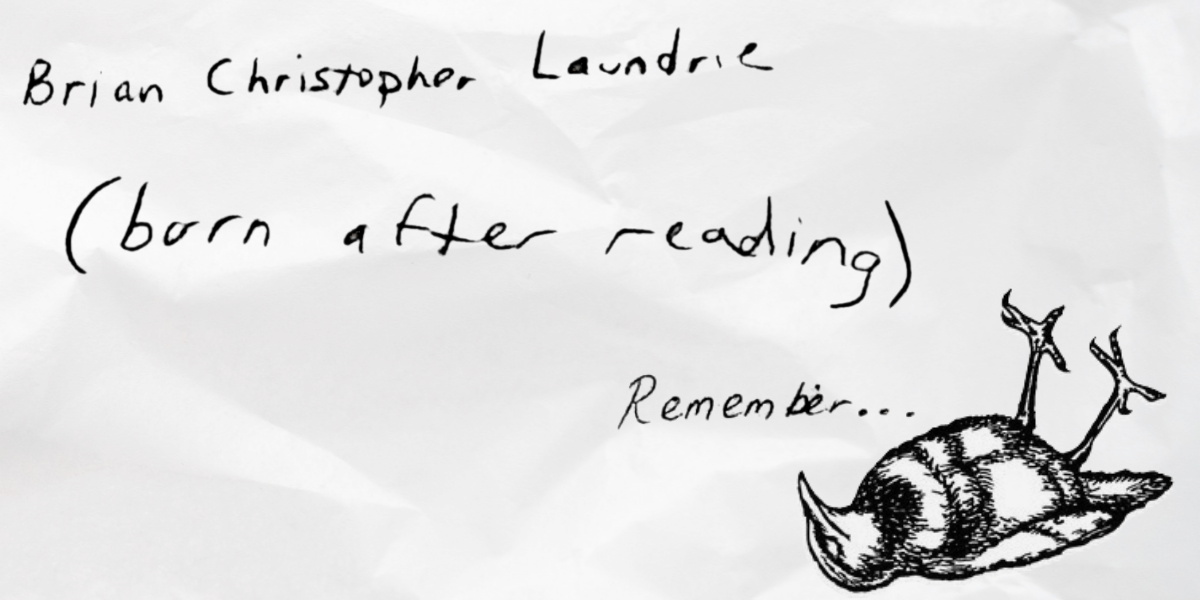
Truth and lies — both are pervasive themes critical to many unsolved cases. Investigators are tasked with finding out what truly happened, all while sorting through evidence that could be leading them in the wrong direction.
And, with cases that have a written component like a ransom note, a penned goodbye letter, or damning written evidence, statement analysis can be the difference between discerning what really happened or being fooled by the content into believing a story that isn’t true.
No family could use this more right now than the Petito family as they’re searching for answers in the undated “burn after reading” letter discovered in Brian Laundrie’s backpack.
Did the Laundries know their son killed his fiancée, Gabrielle “Gabby” Petito, before her body was found?
Many are trying to find out.
Mark McClish, a former federal law enforcement officer for 26 years, says statement analysis is the process of analyzing a person’s words to see if they’re being truthful or deceptive — or to uncover what they really mean to say. His years of working numerous cases has given him invaluable on-the-job experience detecting deception in verbal and written statements. Armed with his learnings, McClish then spent 9 years teaching interviewing techniques at the U.S. Marshals Training Academy.
“People’s words will betray them,” McClish says in a self-published YouTube series. “People give us more information than what they realize. The key to detecting deception is to listen to what a person is saying, and to know what to look for in their statement.”
While McClish hasn’t published his thoughts or opinions on the latest damning letter Roberta Laundrie wrote to her son, Brian Laundrie, many of his lessons can be applied to her writing and language.
But first, let’s rewind the clock to the 2021 search for Gabby.
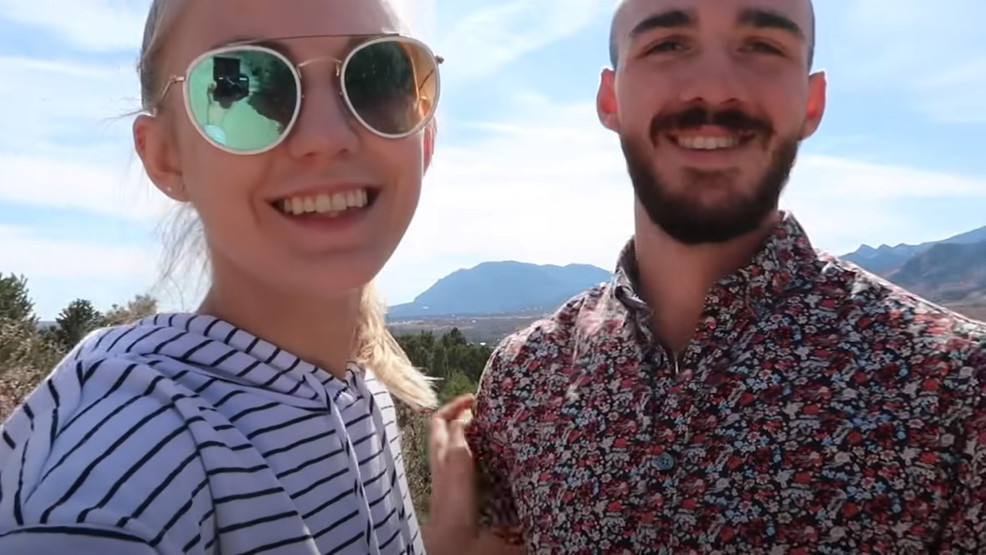
Timeline of Gabby Petito’s Case
In the fall of 2021, the nation was glued to the news channels as high school sweethearts, Gabby Petito and Brian Laundrie, became the focus of everyone’s attention.
The timeline of the case starts well before Gabby was reported missing.
July 2
On July 2, 2021, Gabby and Brian left Blue Point, New York, driving a converted van that Gabby purchased the previous December. They decided to use the money that they were saving for their upcoming wedding and put it towards the trip instead.
The plan was to visit national parks in the Western United States.


August 12
On August 12, after driving thousands of miles, the pair got into a fight while in Moab City, Utah. Officers were called about reports of disorderly conduct, and encountered the couple, and pulled them over while they were in their van. The bodycam footage can be seen here.
While talking with police, Gabby admits that she slapped Brian, fearing that he was going to leave her in Moab. They both agree that Brian did not hit Gabby, but that it was best for the two to separate for the night. Brian was put up in a hotel by a domestic assault outreach group.
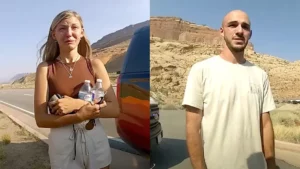

August 27
On August 27, a witness says she saw Gabby and Brian at the Merry Piglet restaurant in Jackson Hole, Wyoming. The witness says she saw Brian screaming at the hostess while Gabby was in tears, apologizing to the staff.
This was the last time Gabby was seen alive.

August 31
On August 31, Brian Laundries mother Roberta canceled a campsite vacation booking that was previously for two people from September 1-3 — and called back on September 3rd to schedule a new booking for three people from September 6-8.

September 1-6
On September 1, Brian returned to the family home in Florida – the day after his mother canceled the original booking and two days before she planned the new trip with her son and husband.
The attorney for the Laundrie family previously confirmed that he stayed with his parents at the campsite for one night on 6 September, leaving the next day.

The Laundrie family home

September 11
On September 11, Gabby Petito’s parents reported her missing after they couldn’t get in contact with her, and the Laundrie family was refusing to say where she could’ve been.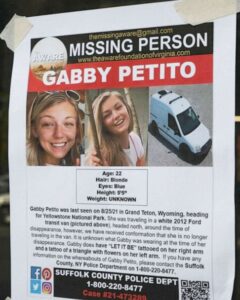

September 14-17
On September 14, the Laundrie attorney Steve Bertolino released a statement to the media, which reads, in part, “On behalf of the Laundrie family it is our hope that the search for Miss Petito is successful and that Miss Petito is reunited with her family.” This statement is currently under scrutiny, and heavily connected to the ‘Burn After Reading’’ letter.
Days after Gabby was reported missing, sometime between September 14-17, Brian vanished.

September 19
On September 19, Gabby’s remains were found in Grand Teton National Park near Spread Creek, with her autopsy confirming that she had been strangled to death.

October 20
On October 20, Brian’s remains were found inside Myakkahatchee Creek Environmental Park, a Florida reserve. He had taken his own life.
Inside his backpack next to his remains was an undated letter written by Roberta to Brian marked “burn after reading.

This letter has now been the subject of discourse. Did his mother know about Gabby’s death? Was this a letter addressing his possible thoughts of premeditated murder, or a note telling her son that his past actions are forgivable because of unconditional love?
Let’s dive deeper.
“Burn After Reading”: Letter Under Scrutiny
In March 2022, Petito’s family sued Laundrie’s parents and the Laundries’ former attorney for emotional distress in connection with her death. The Petito family alleges that the Laundrie family knew Brian murdered Gabby, and were working to help him flee.
A big part of their case is this undated and strange letter written by Roberta.
Laundrie’s parents filed for a protective order on the letter in March of this year, saying Roberta wrote it months before Gabby Petito’s death and so it was not relevant to the case and unnecessary to show it to the public.
Roberta Laundrie added in an accompanying affidavit claiming that she wrote the letter to her son at a time when their relationship was “difficult” and “strained.” She said that she did not know the exact date she wrote the letter but that she gave it to him before he and Petito left for their trip.
“I was trying to connect with Brian and repair our relationship as he was planning to leave home — and I had hoped this letter would remind him how much I loved him,” she wrote.
The Petito family and experts alike don’t believe her claim. Based on the language Roberta uses, the Petito family says it only takes “reasonable inference” to see that “it was written after Gabby Petito was murdered, and is evidence that the Laundries and Attorney Bertolino were aware of Gabby Petito’s demise when the statement at issue was released on September 14, 2021.”
On May 24, Judge Danielle Brewer denied the Laundries’ motion seeking to withhold the letter, and so it was released. To that end, the admissibility of the letter as part of the lawsuit hasn’t been decided upon.
Read the transcript below, and let’s analyze.
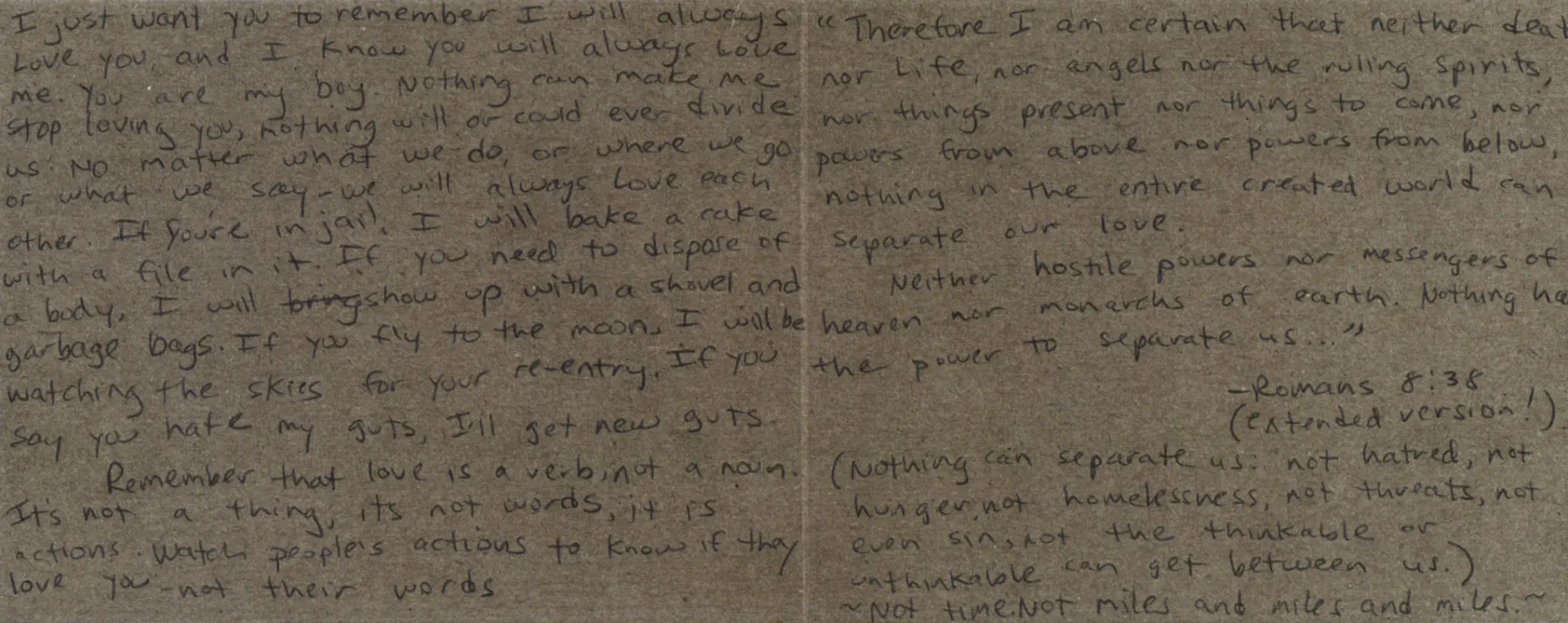
A Shovel, Garbage Bag, and Jailhouse Cake: Analysis
Breaking down the letter line by line, this is what Roberta wrote:
- I just want you to remember I will always
- Love you, and I know you will always Love
- me. You are my boy. Nothing can make me
- stop loving you. Nothing will or could ever divide
- us: no matter what we do, or where we go
- or what we say — we will always Love each
- other. If you’re in jail, I will bake a cake
- with a file in it. If you need to dispose of
- a body, I will bring show up with a shovel and
- garbage bags. If you fly to the moon, I will be
- watching the skies for your re-entry. If you
- say you hate my guts, I’ll get new guts.
- Remember that love is a verb, not a noun.
- It’s not a thing, it’s not words, it is
- actions. Watch people’s actions to know if they
- love you — not their words.
- “Therefore I am certain that neither
- death nor Life, nor angels nor the ruling spirits,
- nor things present nor things to come, nor
- powers from above, nor powers from below,
- nothing in the entire created world can separate our love.
- Neither hostile powers nor messengers of
- heaven nor monarchs of earth. Nothing has
- the power to separate us… ”
- –Romans 8:38
- (extended version!)
- (Nothing can separate us: “not hatred, not
- hunger, not homelessness, not threats, not
- even sin, not the thinkable or
- unthinkable can get between us.)
- ~Not time. Not miles and miles and miles.~
The first thing I notice in the letter is the unnecessary capitalization of the words Love and Life in lines 2, 6, and 18.
Even in the full Romans 8:38-39, the Bible doesn’t have “Life” capitalized in the writing.
This tells me it’s a conscious choice and effort to write it that way. Capitalization is used for emphasis, or to inform the reader that the word is a proper noun, or should be treated that way. I would argue that Roberta believes love and life are two of the most important things.
- me. You are my boy. Nothing can make me
- stop loving you. Nothing will or could ever divide
McClish says that all language has a purpose, and that if you read every word as truth the way the writer intended, then the real truth will be revealed when looking deeper.
From this teaching, I’m drawn to what is written in line 3 and 4: the concept that “Nothing” can make a mother stop loving her son is common. Oftentimes, parents will say unconditional love goes without saying — so to say that there’s “nothing” hints to me that something could make a parent stop loving their child.
Is it possible she had knowledge that something did happen for her to feel the need to write this reassurance and quell any fear that Brian is unlovable?
- stop loving you. Nothing will or could ever divide
- us: no matter what we do, or where we go
I don’t believe it’s a coincidence that Roberta began writing “will” before “could.”
Take the sentences apart, the meanings change if they were: “Nothing will ever divide us,” vs. “Nothing could ever divide us.” The first is future tense rooted in absolutes, whereas the second is a hypothetical. Including “will” first indicates to me that the future tense meaning was what she most likely wanted to get across.
She continues to use “will” in the lines after this.
- Other. If you’re in jail, I will bake a cake
- with a file in it. If you need to dispose of
- a body, I will bring show up with a shovel and
- garbage bags. If you fly to the moon, I will be
In line 9, Roberta crossed out the word “bring” before replacing it with “show up”.
McClish’s teachings say this is something to look deeper into.
“There are no synonyms in Statement Analysis,” McClish says. “Every word or name means something different even if it is only slightly different in meaning.”
Because of this, it’s reasonable to note that “bring” is a verb meaning to “take or go with to a place.” Bring implies some level of planning. If there’s a picnic going on with friends, you’d most likely say you’ll bring the wine, not that you’d show up with the wine.
The phrasal verb “show up” implies arriving unexpectedly. Is this her way of subconsciously noting that while she wouldn’t be there to “bring” the shovel and garbage bags to the planned proverbial murder, but that she would be there at a moment’s notice?
Lines 17 through 25 are Roberta’s summary of Romans 8:35-39 in her own words, even though she has it in quotes. You can see the differences in her writing, and what the Bible says below.
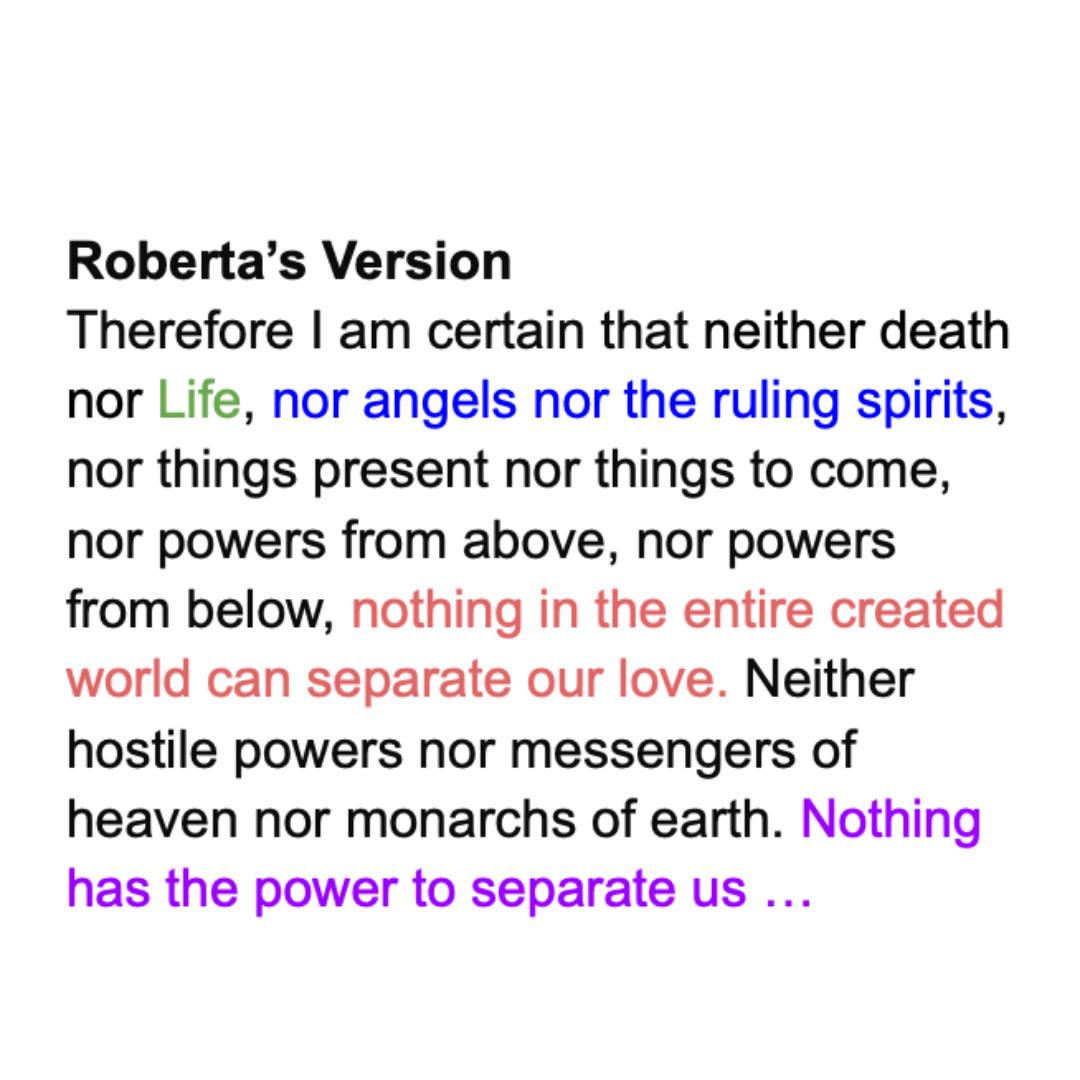
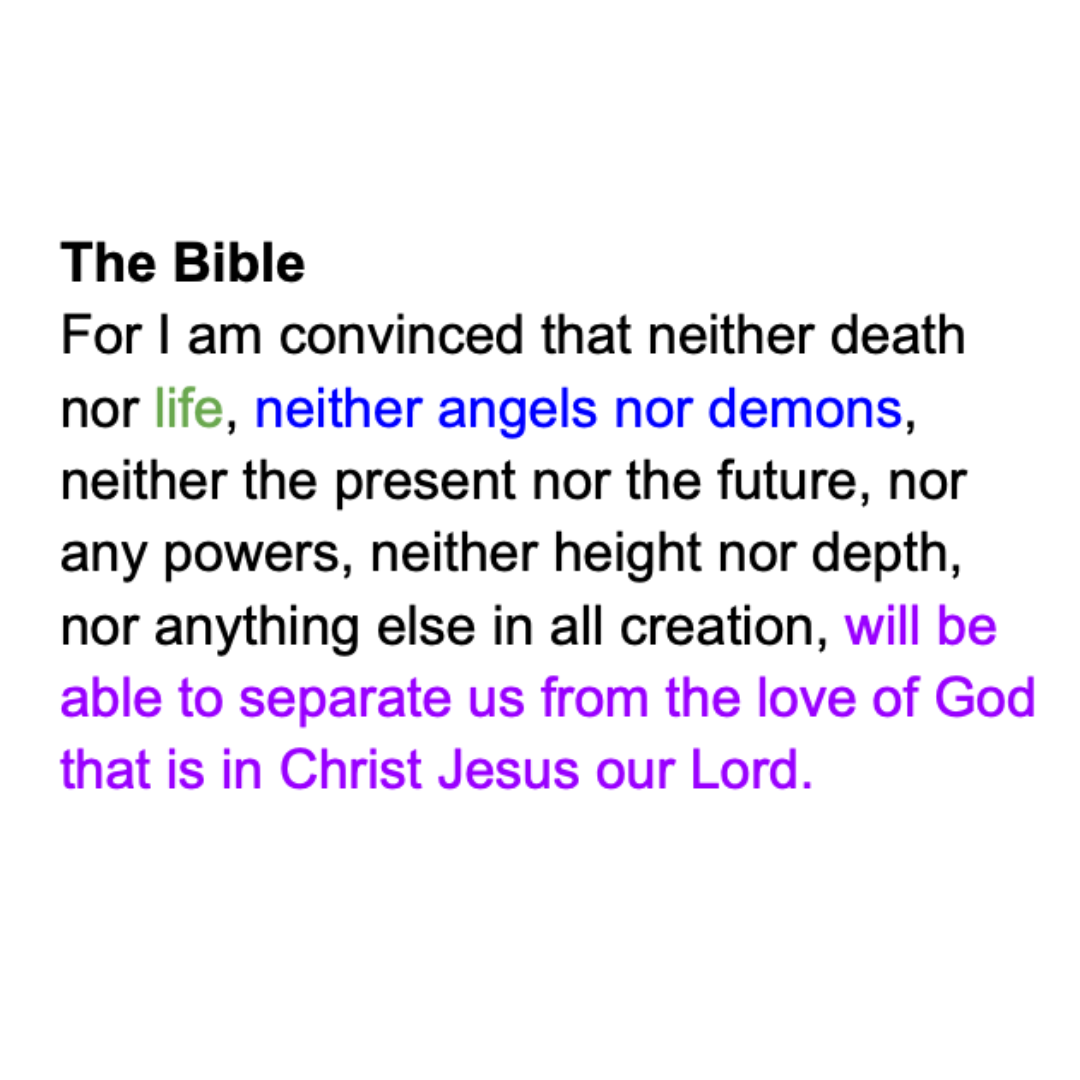
- even sin, not the thinkable or
- unthinkable can get between us.)
Noting that Roberta is devoted enough to her religious practice that she’d quote from the Bible, I think it’s only natural to look deeper into the concept of what she might be alluding to in the “thinkable or unthinkable” getting between them.
There is only one unthinkable sin mentioned in the Bible. It’s a sin deemed so evil, so wicked, and so unbelievably horrific that the Bible says it “never even entered into the mind of God” — this is the sin of parents murdering their children. It’s mentioned three times in Jeremiah.
Could Roberta be noting that no sin is even as horrific as what’s “unthinkable” — like taking the life of another person — get in the way of her loving her son?
Then, there’s the stamped mockingbird.
On the letter, Roberta stamped a mockingbird image next to the word “Remember…”
Many are speculating about what she’s hinting at, or what she wants him to remember. Here’s what we know to be true.
Brian made the mockingbird stamp himself, made after the likeness of the dead mockingbird on the cover of Chuck Palahnuik’s fiction book Lullaby.
We know Brian was infatuated with the book, as it’s in a few pictures from his now-deleted Instagram page.
For context, Lullaby by Chuck Palahnuik is about a newspaper reporter, Carl Streator, who discovers a lullaby in a book that kills anyone who hears it. Carl learns that he can kill someone by only thinking of the poem, so he “semi-voluntarily becomes a serial killer who makes people die over minor annoyances.”
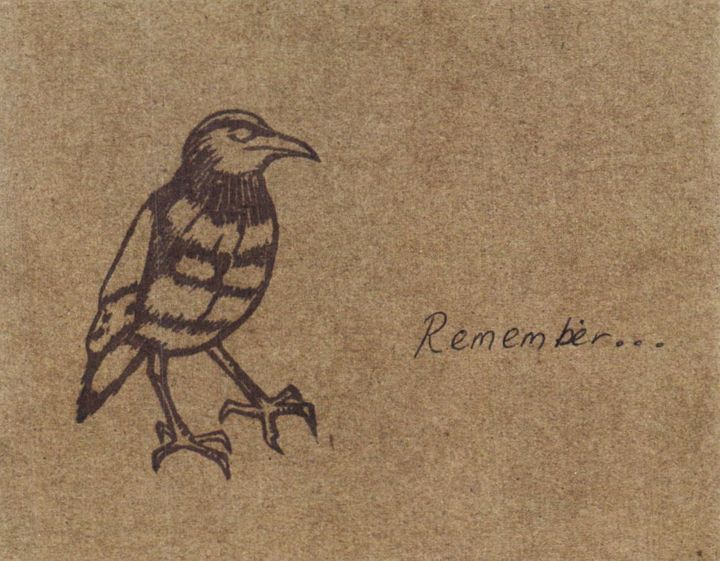
Carl meets a woman, Helen, who agrees to go on a cross-country road trip with him (sound familiar?) to find remaining copies of the book to destroy them to make sure no one else can learn the rhyme. He and Helen have a romantic moment where they declare their love for each other, but Carl later is left skeptical of the relationship.
In the end, Carl ends up killing another character, and surrenders to the police. Helen uses magic she learns along the way to possess the police sergeant and joins Carl to kill everyone.
Is it possible Roberta used the mockingbird stamp to get Brian to “remember” the ending? To remember to surrender to the police because when it’s all over, he will be okay? Or, did Roberta simply say “remember” innocently as a way to help Brian tap into the book-loving adventure-seeking person she knew him to be?
Or, did she use the mockingbird stamp for an entirely different reason… harkening back to the lullaby that the book itself was created after — a lullaby to quiet a crying baby, with the promise of all kinds of rewards given to the child if they don’t speak.
Hush, little baby don’t say a word
Papa’s gonna buy you a mockingbird…
At the end of it all, this is speculation.
We’ll never know unless Roberta says so herself, and even then, the public may never know the truth.
“We look forward to having a jury determine when the letter was written at the time of trial,” the Petito family said about the situation. The jury trial is set for May of 2024.
Love this post? Meet the Author.
Andrea Cipriano is the Content Specialist at Uncovered, where she writes for the twice-weekly true crime newsletter, The Citizen Detective. Andrea graduated with a Master of Arts in Forensic Psychology from John Jay College of Criminal Justice where she focused on researching and peeling back the criminal mind. Andrea believes that it’s never too late for justice.
Uncovered has built a community for thoughtful true crime discussion, advocacy, and comprehensive cold case research. We are the hub for novice and experienced researchers alike, helping members further develop their citizen detective skills. Sound like something you’re interested in? Join our community. Together, we can make a difference.
